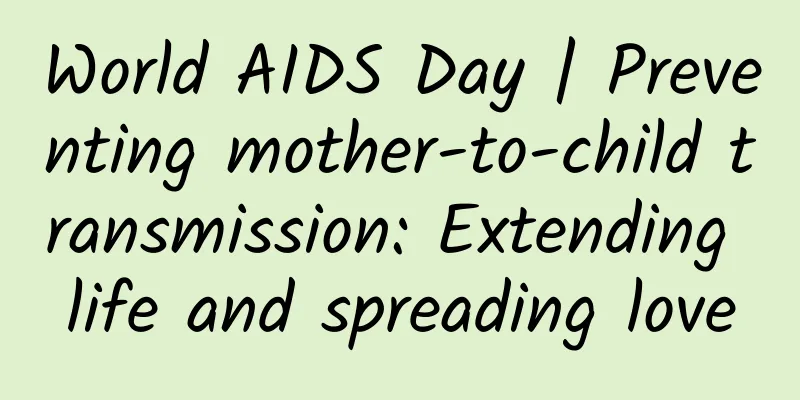World AIDS Day | Preventing mother-to-child transmission: Extending life and spreading love

|
Zhenzhen's Story In 2019, Huang Yingying, associate professor of the Department of Sociology at Renmin University of China and director of the Institute of Sexual Sociology, published the book AIDS and the Logic of Life, which tells the life stories of many AIDS patients, including this one: Zhenzhen, 28, has a one-year-old child. She married her husband because she was pregnant. On the third day after their marriage, her husband had a blood test at the hospital and was found to be infected with HIV. Subsequent tests showed that Zhenzhen was also infected. Neither of them knew how they were infected, and they felt there was no need to delve into the issue because they were more worried about the child in their belly. Fearing that the child would also be infected, Zhenzhen reluctantly aborted the child. After that, whenever Zhenzhen saw other people's children, she was envious and sad. She wanted to have a child of her own, but she didn't dare to have one. Until one day, by chance, she heard about mother-to-child transmission blocking. When she went to the hospital to get the medicine, Zhenzhen consulted the doctor. The doctor was very enthusiastic and said that now more than 90% of mother-to-child transmission blocking will not cause infection. She has guided many cases and none of them were infected. The doctor supported Zhenzhen to have a child and gave them great confidence. "We both cried with joy as soon as we left the hospital." After the mother-to-child transmission was blocked, Zhenzhen finally gave birth to a healthy child. Zhenzhen felt that she was very lucky. The child brought her great happiness. Her biggest hope now is to live until the child is 20 years old. For this reason, she works hard every day and strives to live every day well. Zhenzhen's story gives a glimmer of hope to every female infected person who wants to have a child, allowing them to take a step towards a normal life. So, what is mother-to-child transmission prevention? How should it be done? Mother-to-child vertical transmission is one of the three main ways of HIV transmission. What we call mother-to-child transmission prevention, that is, blocking mother-to-child vertical transmission of HIV, is an effective measure to prevent mother-to-child transmission of HIV, which includes: early intervention with antiretroviral drugs + safe delivery + postpartum feeding guidance. According to statistics, 95% to 97% of HIV-positive mothers can successfully achieve HIV prevention and give birth to healthy babies after standardized intervention. Vertical transmission from mother to child There are three ways of HIV transmission: sexual contact, blood transmission, and mother-to-child transmission. Infants are mainly infected with HIV through mother-to-child transmission. Pregnant women infected with HIV may transmit the virus to their babies during pregnancy, delivery, and postpartum breastfeeding. Intrauterine infection When the baby is growing in the mother's womb, the HIV in the mother's body can pass through the placenta and cause the baby to be infected with HIV. Birth canal infection When the baby is eager to meet the world and tries hard to get out of the birth canal, he or she may be at risk of contracting HIV when coming into contact with the mother's secretions and blood. Neonatal infection If a mother breastfeeds her baby, HIV can also be transmitted to the baby through the mother's breast milk. Therefore, to block mother-to-child transmission of HIV, it is necessary to intervene in the above three processes, namely: blocking during pregnancy, blocking during delivery, and blocking after delivery. Mother-to-child transmission prevention "passes three levels" Pregnancy blockade Early pregnancy test & timely medication HIV infection has an asymptomatic incubation period. Most babies infected with HIV are caused by the fact that the expectant mothers did not find out that they were infected and failed to take appropriate blocking measures in time. Therefore, expectant mothers must have prenatal examinations in the early stages of pregnancy. Prenatal examinations include free HIV testing. For mothers infected with HIV, relevant medical institutions will provide free antiviral drugs. As long as mothers follow the advice of professional doctors, choose the appropriate medication plan, and take antiviral treatment in time, effective virus control can be achieved. At the same time, relevant medical institutions will also provide professional services such as safe sex guidance, infection symptoms and signs monitoring, nutritional support, psychological support, sexual partner notification and testing. At present, the main antiretroviral drugs in China are zidovudine, lamivudine, lopinavir/ritonavir, tenofovir, nevirapine, efavirenz, etc. Before taking the medicine, expectant mothers need to undergo CD4+T lymphocyte count, viral load test and other related tests to assess the infection status and facilitate doctors to determine the medication plan. During medication, CD4+T lymphocyte count and other related tests are performed every 3 months to monitor the treatment effect. A viral load test is performed in the third trimester and the test results are obtained before delivery to assess the risk of HIV infection in the baby. It should be emphasized that expectant mothers may experience many adverse drug reactions when taking medications, such as nausea, vomiting, diarrhea, rash, etc., but for the healthy birth of the baby, expectant mothers must take the medication on time, because good medication compliance is the key to successfully blocking mother-to-child transmission! Labor blockage Safe delivery & avoiding injuries If the first stage is passed safely, the baby and mother will enter the second stage - labor interruption. At this time, according to the advice of professional doctors, choose the appropriate delivery method and determine the appropriate delivery hospital. The expectant mother should go to the hospital in time to wait for delivery. If the viral load is too high in the late pregnancy, a cesarean section should be selected. After the baby is born safely, the doctor will clean the baby with running warm water in time and use an ear bulb to clean the baby's nasal and oral mucosa, shortening the baby's contact time with the mother's blood, amniotic fluid and secretions, and minimizing the risk of infection. Postpartum blockade Preventive medication & artificial feeding After the baby is born, relevant medical institutions will provide free antiviral drugs, and doctors will give them to the baby within 6 to 12 hours after birth to prevent infection. Since HIV may be transmitted to the baby during breastfeeding, artificial feeding is recommended, breastfeeding should be avoided, and mixed feeding should be eliminated. For families who are breastfeeding because they do not have the conditions for artificial feeding, mothers must adhere to antiviral treatment during feeding to reduce the risk of infection for the baby. Breastfeeding should not exceed 6 months. After that, relevant medical institutions will conduct follow-up visits and physical examinations when the baby is 1, 3, 6, 9, 12, and 18 months old, and provide services such as growth and development monitoring, infection status monitoring, immunization, and HIV testing (including antibody testing and early nucleic acid testing). Children are the spiritual sustenance of their parents. It is the hope of the family. Every mother hopes that her baby will be healthy. If you are infected with HIV, Please follow scientific guidance and advice. Blocking AIDS, Pass on the love. Go forward for love, Achieve zero mother-to-child transmission of HIV. Author: Luo Yuxuan, Chief Pharmacist of Eastern Theater Command General Hospital Review expert: Ren Yanli, chief pharmacist of the Gynecology and Pediatrics Group of the Henan Pharmaceutical Association Hospital Wei Guoyi, Chief Pharmacist, Beijing Anzhen Hospital, Capital Medical University |
<<: What are the methods of making cocktails? What can be mixed with cocktails?
>>: Don’t think that if you don’t feel any pain, the situation will be calm.
Recommend
Is a water bag bra harmful to the body?
Bras are special pieces of clothing that effectiv...
Periarthritis of the shoulder - stop the inflammation of the shoulder
Scapulohumeral periarthritis is also known as per...
5 different types of hypertension have different "techniques" for lowering blood pressure, and you need to pay attention to them
Many hypertensive patients told Huazi that they i...
What is uterine cyst?
Gynecological diseases have the greatest impact o...
Conservative treatment of ectopic pregnancy HGC rebound
Nowadays, we can see in the news that many women ...
Will breast hyperplasia cause armpit pain?
Women's breasts may develop a variety of dise...
Is postpartum yoga useful?
Women who have done confinement should be familia...
White particles on female nipples
If white particles appear on a woman's nipple...
The invisible challenge in controlling blood sugar: How much do you know about hypoglycemia?
Author: Zhu Jing, Hanzhong Central Hospital, Shaa...
What to do if you don't have your period during menopause
Menopause is actually a series of unusual behavio...
Chorionic villus hormone is high, it means son
Our physical condition is not static. The health ...
WinAppUpdate: The number of Windows Store apps exceeds 3,000
According to the latest data from WinAppUpdate, t...
What causes postpartum finger joint pain?
During pregnancy, the body's hormones often u...
Can breast massage relieve breast hyperplasia?
Fibrocystic breast disease is a breast disease, a...
How should diabetic patients control blood sugar through exercise?
Author: Zhan Hong, Chief Physician of the First A...









